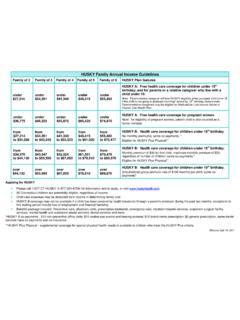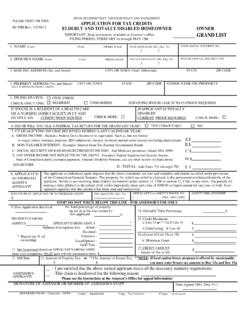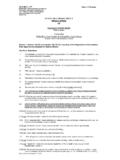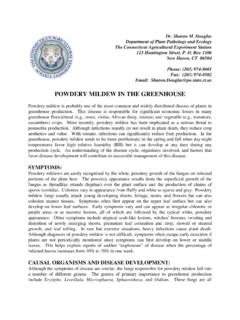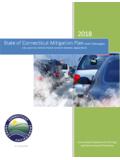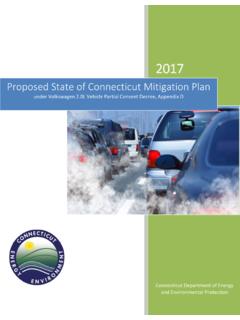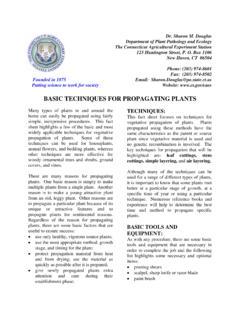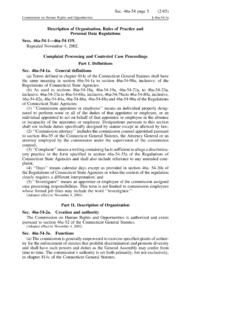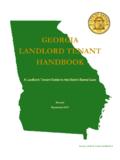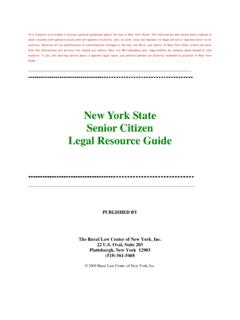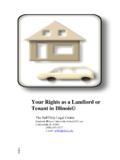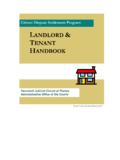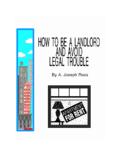Transcription of Housing Police Manual - CT.GOV-Connecticut's …
1 landlord / tenant Disputes Police Training Manual Released October 6, 2009 2 Introduction This booklet, which has been prepared by the Office of the Chief State s Attorney with the advice of the Citizens Advisory Council on Housing Matters, is intended to help you as a Police officer when you respond to Housing -related complaints. While most landlord - tenant complaints are handled by the civil court system, there are important parts of landlord - tenant law that are defined as criminal.
2 For them, Police intervention is often very important. In four separate parts, we have attempted to address the four types of complaints that are most likely to call for Police action. These are: Part I Lockouts and self-help 2 Part II Unlawful entry .. 14 Part III No-heat and termination of essential 17 Part IV Criminal damage to a landlord s property .. 22 We have used a question-and-answer format in an effort to anticipate the kinds of issues that arise in your day-to-day work.
3 Paragraphs based on a specific statute include a citation to that statute. Many of the statutes cited are collected in an appendix at the end of the booklet. To whom can I speak for further advice? Your most important resource for additional information is your shift supervisor. If you are in doubt, you should not hesitate to ask. You can also call your local Housing prosecutor or the Supervisory Prosecutor for Housing Matters for guidance. General Statutes 51-278(b)(1)(A) establishes a statewide system of prosecutors to handle all prosecutions in the state of Housing matters deemed to be criminal.
4 Each of the Housing prosecutors covers a particular portion of the state. At the present time, the Housing prosecutors are: Judith R. Dicine Supervisory Asst. Prosecutor for Housing 203-773-6755 (Open position) Bridgeport and Norwalk areas 203-579-7237 Robyn S. Johnson Hartford, New Britain, and Middletown areas 860-756-7810 Patrice K. Palombo New Haven and Waterbury areas 203-773-6755 Rafael I. Bustamante Eastern connecticut areas 860-870-3267 Statutory authority: General Statutes 51-278(b)(1)(A).
5 3 Part I Lockouts and self-help evictions Summary A landlord may never lock out a tenant . landlord includes private landlords, Housing authorities, and any other persons who rent residential dwelling units to tenants. No tenant may ever be locked out of a residential dwelling unit or a commercial rental by anyone other than a proper court officer (a state marshal or a constable) acting on a proper court order and after giving advance notice to the tenant and the municipality. What is a lockout ?
6 A lockout is any conduct by the landlord or the landlord s agent that, without a court order (usually obtained through an eviction action and carried out by a state marshal), deprives a tenant of a dwelling unit or other rented unit of access to the unit or to the tenant s personal possessions. The most common form of lockout occurs when a landlord changes the locks or removes a tenant s personal possessions from the dwelling unit. Force or intimidation is often associated with lockouts, but neither force nor intimidation is necessary for a lockout to have occurred.
7 There are many other ways to lock a tenant out. In the general sense, any action that has the purpose or effect of denying the tenant access to or use of the dwelling unit or other rented unit or his possessions may be a lockout. The term criminal lockout is used for residential lockouts that violate the specific provisions of General Statutes 53a-214. That statute applies only to lockouts from dwelling units and only to conduct that deprive a tenant of access to the dwelling unit or to personal property.
8 Commercial property lockouts are also illegal, as commercial property landlords are similarly obligated to follow summary process eviction procedures and cannot remove a commercial tenant without a court order. In addition, even in residential premises, a tenant can illegally be forced to vacate by means other than denying access, such as shutting off utilities to force the tenant to leave or by otherwise making the unit unusable, such as by removing the door to the dwelling unit. On commercial lockouts and on residential lockouts not covered by 53a-214, other statutes, such as criminal trespass, criminal mischief, harassment, reckless endangerment, and larceny may be applied.
9 All such conduct is criminal. As a result, in making an arrest and charging a defendant, you should distinguish between a criminal lockout under 53a-214 and other similar criminal conduct for which other statutes should be cited. Is a lockout legal? With certain narrow exceptions (see p. 7-8 for further explanation), all lockouts are illegal. In particular, it is almost always illegal to lock a resident out of an apartment, a rooming house, or a boarding house. This is so, no matter what the occupant is called ( tenant , roomer, boarder, etc.)
10 , how the occupant s legal status is classified, or whether the occupant pays by the month, the week, or even the day. Do not be fooled by the labeling a person is not a guest or squatter merely because the landlord refers to him as a guest or a squatter. As a general rule, if the unit is 4where the person lives, the person cannot be locked out. You should also note that a residential tenant cannot waive his right to eviction by lease or other rental agreement. Any occupant locked out illegally has the right to be restored to possession.
